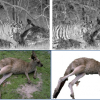528 search results - page 40 / 106 » Causal inference using the algorithmic Markov condition |
CISS
2010
IEEE
14 years 1 months ago
2010
IEEE
—This paper considers the reconstruction of structured-sparse signals from noisy linear observations. In particular, the support of the signal coefficients is parameterized by h...
ICMI
2007
Springer
15 years 4 months ago
2007
Springer
We address the problem of automatic interpretation of nonexaggerated human facial and body behaviours captured in video. We illustrate our approach by three examples. (1) We intro...
ICCV
2009
IEEE
16 years 2 months ago
2009
IEEE
In recent years the Markov Random Field (MRF) has
become the de facto probabilistic model for low-level vision
applications. However, in a maximum a posteriori
(MAP) framework, ...
107
click to vote
EMMCVPR
2005
Springer
15 years 3 months ago
2005
Springer
In this paper, we consider the problem of color restoration using statistical priors. This is applied to color recovery for underwater images, using an energy minimization formulat...
CDC
2009
IEEE
15 years 2 months ago
2009
IEEE
Abstract— Q-learning is a technique used to compute an optimal policy for a controlled Markov chain based on observations of the system controlled using a non-optimal policy. It ...


